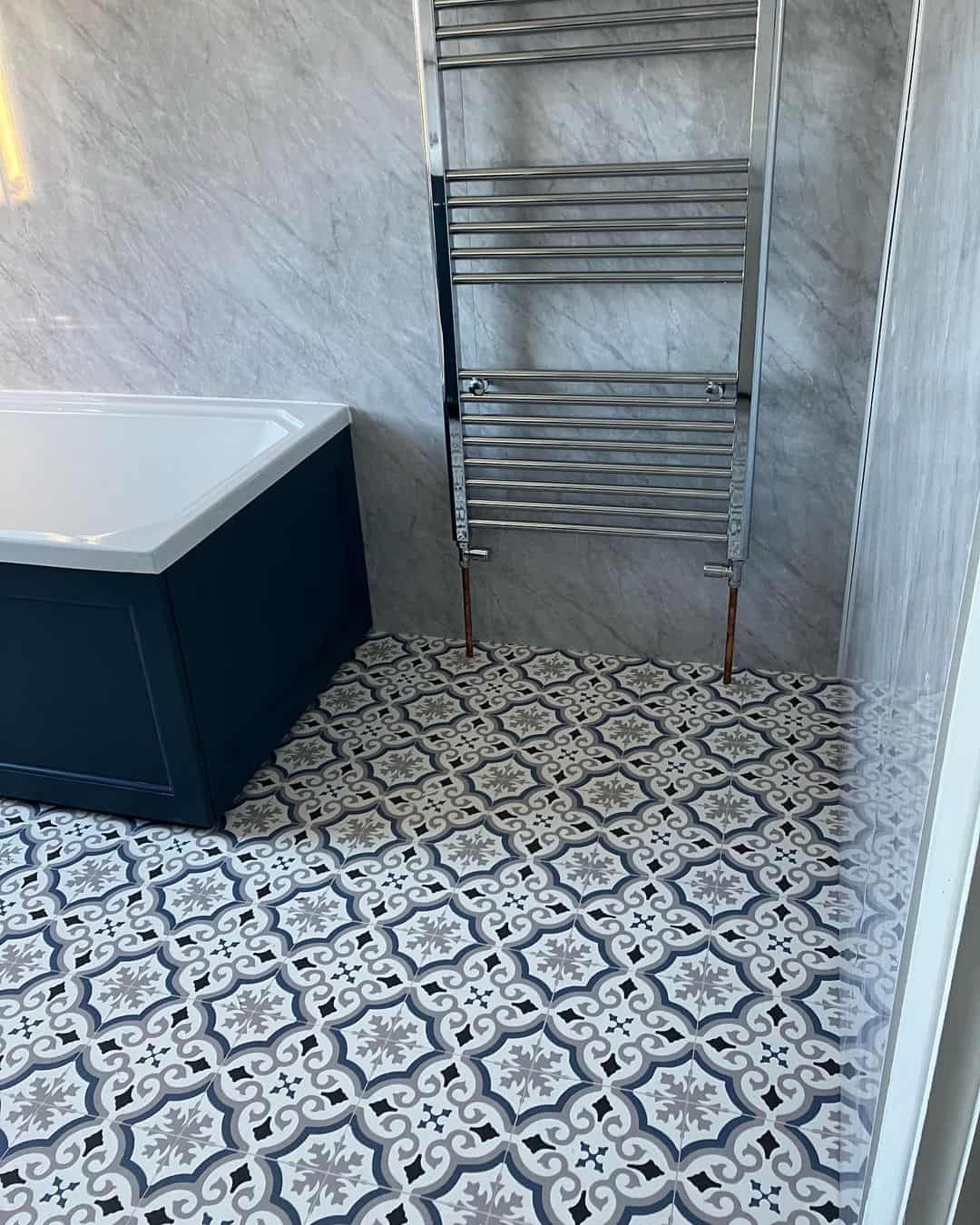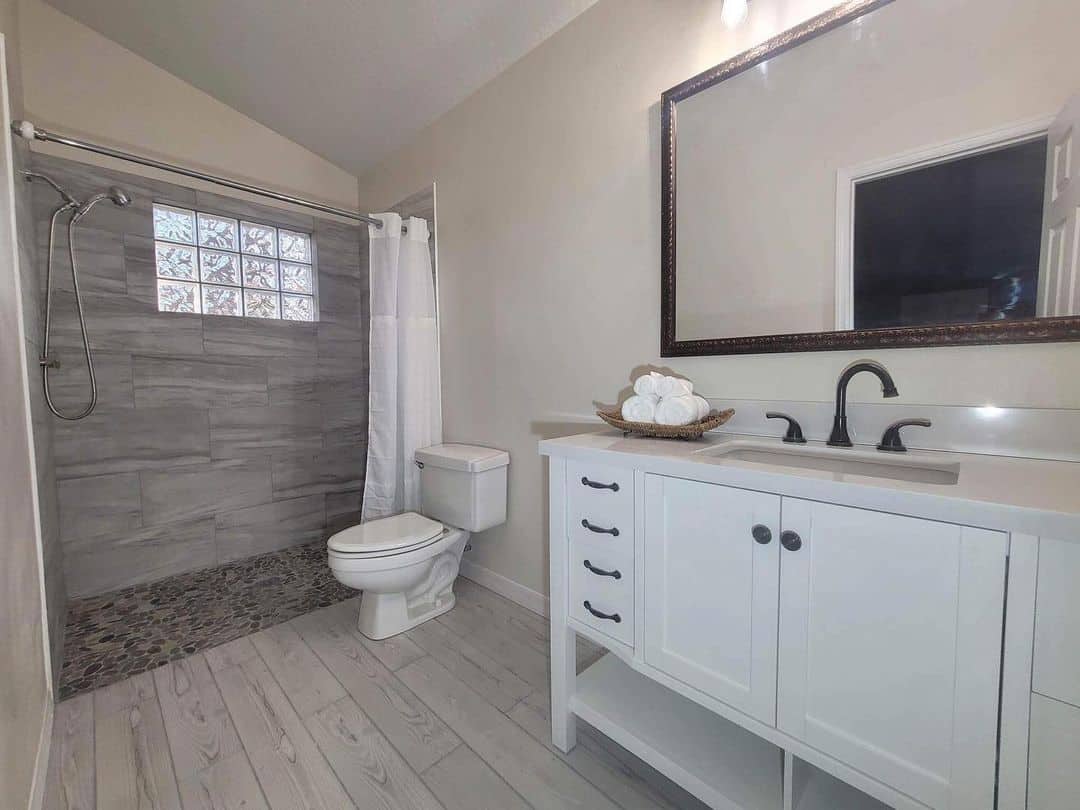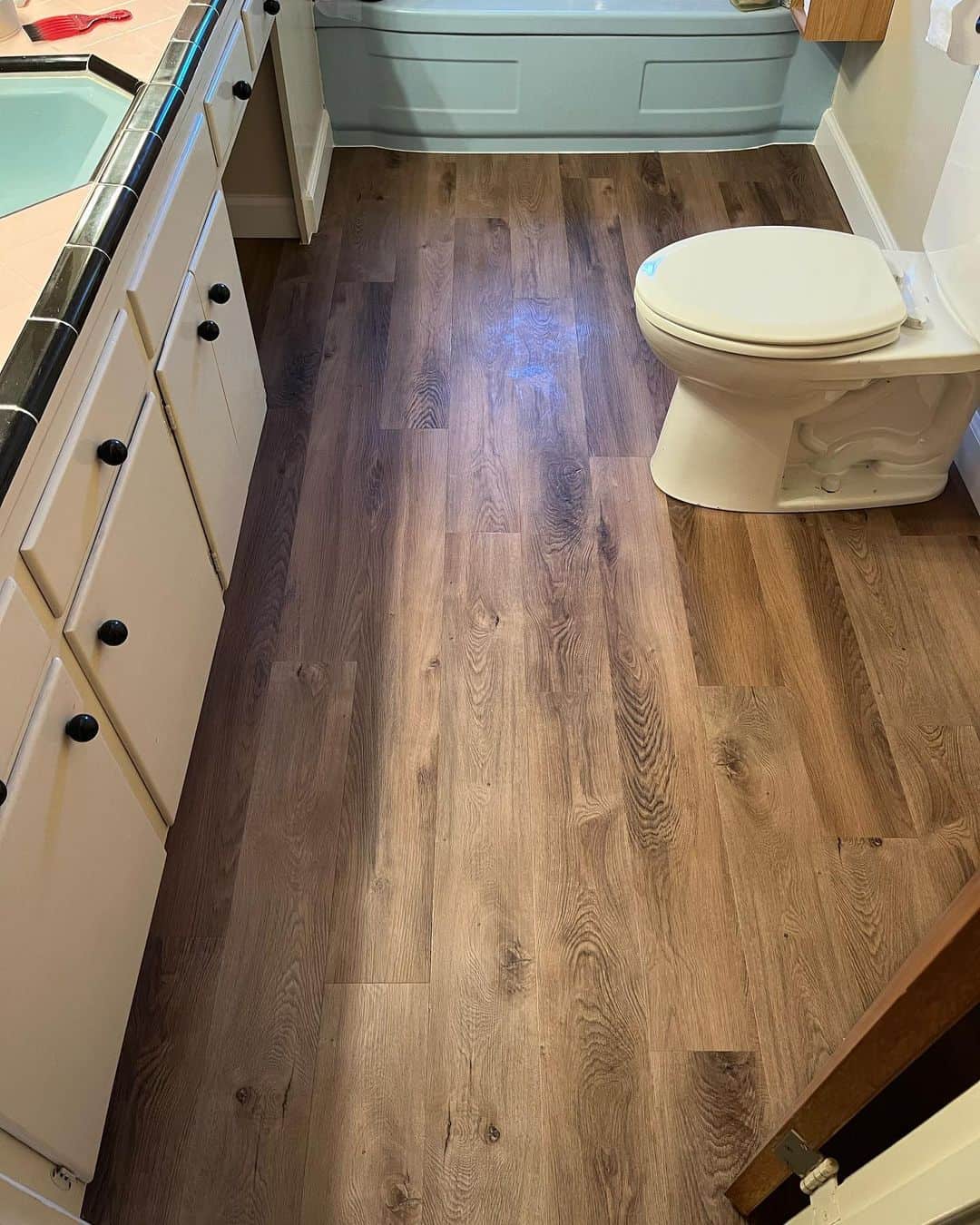If you are redecorating a bathroom, one of the most important questions to ask is what flooring should you choose. You need flooring that is comfortable under your feet and waterproof. Vinyl plank flooring can be an inexpensive flooring option, but can it be used in a bathroom?
Read on to find the answer and learn key information about vinyl plank flooring including the pros and cons.
Table of Contents
Can You Install Vinyl Plank Flooring in a Bathroom?
Vinyl plank flooring is waterproof so it can be used in bathrooms. Flexible PVC is used as the primary core material in vinyl planks. They are then given a chemical top layer, which makes the planks durable and resistant to scratches.
Vinyl planks come in a range of thicknesses. Thinner planks are the cheapest, with the cost rising the thicker the planks get. The planks click together so there is no need for glue or nails in the installation.
Vinyl plank flooring has become popular because it can imitate wood plank flooring even better than laminate flooring can. As well as imitating wood, designs for vinyl plank flooring include ones that mimic ceramic or porcelain tiles, and marble, granite, or other natural stones.
How does Vinyl Plank Flooring Differ From Sheet Vinyl?
While sheet vinyl flooring is formed from a single thin layer of flexible vinyl and glued to the subfloor, plank flooring is thicker and uses a tongue-and-groove system to connect the floorboards. Sheet vinyl is cheaper but vinyl plank flooring has better durability.
The Benefits of Vinyl Plank Flooring in Bathrooms
Not only is vinyl plank flooring fully suitable for bathrooms, but there are also many benefits to choosing it for your bathroom. Of course, like with any flooring, there are some cons, too, which you will find further in the article.
1. Fully Waterproof
This is without a doubt the most important quality of bathroom flooring. It is normal to get spills and splashes in your bathroom from the sink, the shower, the bath, and even the toilet. Because vinyl plank flooring is fully waterproof, it will not get damaged when continuously exposed to moisture.
2. Durable
One of the biggest pros of vinyl plank flooring is its durability. When correctly installed, even the middle-range vinyl plank floors should last around a decade. However, cheaper planks are more easily damaged so it is worth spending a little more to get better-quality flooring.
3. Relatively Inexpensive
While vinyl plank flooring is generally more expensive than vinyl sheets or vinyl tiles, it is a less expensive option than hardwood flooring or tiles. It is also cheaper and easier to install than hardwood or tiles, which is something you need to consider if you are not installing the floor yourself.
4. Easy to Maintain And Clean
Vinyl plank floorings are super easy to keep clean. They do not require you to use any special cleaning agents, nor do they require any specific maintenance routines. Stains can be easily removed with a general bathroom cleaner.
While tiles are easy to keep clean, too, the same cannot be said for the grout between the tiles and discolored grout can quickly make a bathroom look grubby and old. When correctly fitted, the seams should be invisible in vinyl plank flooring and should not collect dirt or debris.
5. Warmer Than Tile Underfoot
While material such as tiling can feel lovely and cool under your feet during the hot summer months, it is not so desirable during the winter months. If you are looking for a floor that feels warmer underfoot, then vinyl planks are a better option. This is because they insulate temperature better than many other materials.
6. Slip Resistance
Some types of flooring, such as ceramic tiles, can get very slippery when wet and become a safety hazard. Vinyl plank flooring is a slip-resistant option. Choosing vinyl planks for your bathroom can reduce the risk of someone slipping as they get out of the shower or bath with wet feet.
7. Quiet
Hard surfaces do not absorb sound. Instead, sounds bounce off them and can even get magnified in smaller bathrooms. Vinyl plank flooring has a softer composition than, for example, tiles or hardwood floors, which means it absorbs sound better.

c_frost_flooring
What Are The Cons of Vinyl Plank Flooring?
Before you decide on whether vinyl plank flooring is the right option for your bathroom, it is important to know all the cons, too.
1. Some Vinyl Plank Flooring is Expensive
While most options of vinyl plank flooring are budget-friendly, others come with a much bigger price tag. For example, COREtec flooring is a premium option and the prices per square foot match those for good hardwood flooring.
2. Some Types of Vinyl Plank Flooring Are Hard to Remove
If you choose vinyl plank flooring that uses glue, you should know that it is very difficult to remove. Glued-down planks are also harder to install than planks that only require you to click them together.
3. Cheap Options Are Easy to Damage
While most vinyl plank flooring is extremely durable, not all are. If you see vinyl plank flooring that is noticeably cheaper than the average, it is better to avoid it. Cheap plank flooring can start warping only a few months after it has been installed.
So while a cheaper option can be tempting and better suited for your budget, it is not the best option in the long run. You could end up replacing your floor much sooner than you intended and as a result, end up spending more.
4. Can Fade Quickly
How fade-resistant your vinyl plank flooring is has a lot to do with the quality of the wear layer. Some brands will not include UV protection on the wear layer to save on production costs. As a result, the floors can start to fade when exposed to even a small amount of sunlight.
5. It Doesn’t Improve The Resale Value of Your Home
Homeowners who are updating a bathroom before a house sale should not expect vinyl plank flooring to increase the resale value. On the other hand, it will not harm the value either, and a fresh-looking bathroom with a new floor can make the house more attractive to prospective buyers.
6. They Are Not The Most Eco-Friendly Option
Since vinyl planks are made of PVC, they are essentially plastic and therefore not the most eco-friendly flooring choice. However, many brands that make luxury vinyl plank (LVP) flooring, are incorporating more sustainable practices and many modern LVP products are either fully or partially recyclable.

2stepflooring
What to Look For When Choosing Bathroom Flooring?
When you are choosing the floor material for your bathroom, you want to pick the option that fits your budget and ticks as many boxes as possible. The flooring should be at least water-resistant but waterproof flooring is better. You also should look for flooring that is slip-resistant, easy to clean, and durable.
You also want to consider how easy the flooring is to install. Vinyl plank flooring is easy to install while tiling or hardwood floorboards will require more work and are easier to get wrong. If you are getting someone to install the flooring for you, they are likely to charge less for vinyl plank installation than tiles or hardwood flooring.
Finally, look at the cost of different flooring options. What is the most waterproof, durable, and slip-resistant option you can get with your budget? The good news is that vinyl plank flooring is completely waterproof and less expensive than tiles or hardwood flooring. It also comes in a wide variety of designs so you are likely to find one to suit the decor in your bathroom.
What is The Worst Type of Flooring For a Bathroom?
Some flooring options should never be used in a bathroom because they are far from being waterproof and therefore easily damaged when used in wet spaces.
1. Carpet
Although not unheard of, most people would not consider installing a carpet in their bathroom. While carpets are soft and warm, they also retain a lot of moisture and will dry slowly. Over time, carpets in bathrooms will develop a mildew smell and encourage mold growth.
2. Linoleum Tiles
People often think linoleum tiles are a good option for bathrooms because they are water-resistant. However, they are water resistant only to a certain extent and in busy bathrooms, the tiles can become distorted as they get penetrated by moisture.
3. Solid Hardwood Flooring
Even though hardwood flooring is sometimes found in bathrooms, it is not recommended. Hardwood floors only have a topcoat that protects them from moisture. Eventually, water will penetrate through the top coat and as it sinks into the wood, it will rot.

3rdgenerationflooringllc
Conclusion
Vinyl plank flooring is not only suitable for bathroom use but it is one of the most moisture-resistant, durable, and stain-resistant options while still being budget-friendly. However, avoid cheap options as they damage more easily and can start buckling only months after installation.
Hopefully, this article has answered all your questions on vinyl plank flooring. Should there be anything you would like to ask about them, write your questions in the comments box.
HOw do I seal around the tub or shower once the LVP flooring is laid?